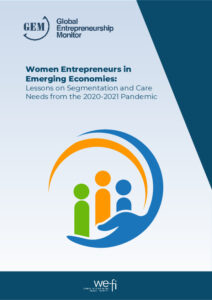Women entrepreneurs in emerging economies represent some of the most vulnerable entrepreneurs globally. Many faced exceedingly difficult business impacts during the COVID-19 pandemic which could have been – and could still be – addressed through policy action.
We-Fi collaborated with the Global Entrepreneurship Monitor (GEM) for the new policy brief: Women Entrepreneurs in Emerging Economies: Lessons on Segmentation and Care Needs from the 2019-2021 Pandemic. This report explores how the pandemic impacts have persisted for women entrepreneurs with a particular focus on four low-income economies between 2019-21: Egypt, India, Iran and Morocco. The goal of this focused study is to inspire new and innovative approaches to supporting women entrepreneurs in emerging economies.
Key Findings

Dowload the full Policy Brief here.
Startup rates for women in lower income countries dropped by over half from 2019 to 2020, only partially recovering in 2021. Business closure rates rose by about 25% for women in lower income countries and remained high from 2019 to 2021. However, in 2021, women in lower income countries were close to parity with men with about one in five reporting business closures due to the pandemic. Importantly, while men in lower income countries experienced a doubling in business closure rates, women in lower income countries showed the highest business exit to entry ratios across all groups in 2020.
Entrepreneurial intentions were high for women in lower income countries in 2021. Women business owners, both early-stage and established (in business for more than 42 months), reported the highest rates of seeing new business opportunities as a result of the pandemic and the highest rates of adopting new digital tools during the pandemic. Women in lower income countries also reported the pandemic’s devastating impacts on their businesses and family demands. Notably, these impacts varied in important ways across industry sectors, business stages and cultural contexts.
Business disruption will inevitably take place again, whether related to another pandemic, the impacts of climate change, political or other global unforeseen circumstances. Entrepreneurship is increasingly seen as an important contribution to resilient and healthy societies, and women entrepreneurs are especially important for growth in emerging economies. Findings from GEM’s national teams’ survey-based research on business startup activity around the world show that women business owners in emerging economies faced significant challenges during the pandemic, triggering fears of insurmountable setbacks in progress towards gender equality. At the same time, women remain some of the most optimistic and resilient entrepreneurs on the planet and are particularly motivated by a desire to contribute to a better world. So much is at stake. Past estimates by the Boston Consulting Group and Citibank suggest that a sustained and concerted effort to help women start and grow businesses at the same rates as men could boost the global economy by over $2 trillion; this brief outlines We-Fi and GEM’s model illustrating how empowering women entreprenurs could instead add $5 to 6 trillion of new GVA (gross value added). These studies all underscore that more support for women entrepreneurs is fundamental to driving economic growth.


